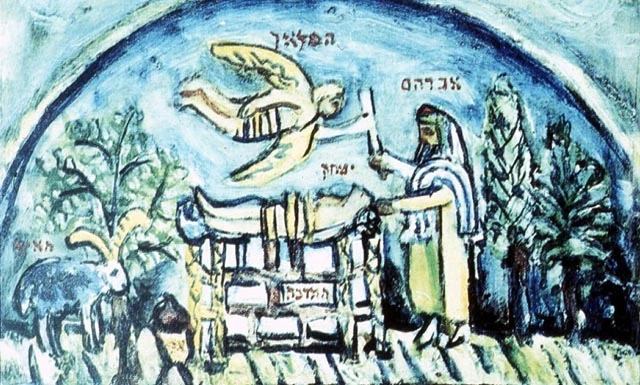A Soul Cries Out: My Fire Is Dead
The Story of an Impoverished Widow and a Cruse of Oil. Maamar Veisah Achas by Rabbi Schnuer Zalman of Liadi
1 hr 10 min
- October 25, 2012
- |
- 9 Cheshvan 5773
Yossi Paltiel
1219 views- 5Comment
- Call-in
Listen to the class on the phone
Call +1 (845) 201-1933
When prompted, dial the ID number below.
365 MP3 MP4 Source Sheets - Copy Embed
Dedicated by THE CHANIN FUND
In honor of the birthday of Reb Zalman Chanin
May G-d give him strength to continue his holy work in good health, wealth, and happiness, with much Nachas from his family
Class Summary:
Tags
Show More
Categories
Yossi Paltiel
- October 25, 2012
- |
- 9 Cheshvan 5773
- |
- 1219 views
Dedicated by THE CHANIN FUND
In honor of the birthday of Reb Zalman Chanin
May G-d give him strength to continue his holy work in good health, wealth, and happiness, with much Nachas from his family
Related Classes
Please help us continue our work
Sign up to receive latest content by Rabbi YY
Join our WhatsApp Community
Join our WhatsApp Community






Please leave your comment below!
abruck -9 years ago
It would be nice to have the translation of the Hebrew source material
Reply to this comment.Flag this comment.
SM -12 years ago
"created" new teachings.
Thank you for your shiurim.
U mentioned and used the expression the Alter Rebbe "invented" "created" new teachings.
-Can you explain the word 'create' in the Chassidus context.?
-Are they not teachings taught (mekabel) from their teachers or some where else?
-As u mentioned there are (too) few teachings which we can see came from the Maggid or BaalShemTov and developed by the Rebbeim. (In the Mishna Gemahra Tulmudic model we see clearly the development & discussion and they are vaiidated via logic,) but in Chassidus it appears it can only be validated by the "soul" and we are not so finely attuned ...?
Reply to this comment.Flag this comment.
SM -12 years ago
The word 'create' in the Chassidus context.
Thank you for your shiurim.
U mentioned and used the expression the Alter Rebbe "invented" "created" new teachings.
-Can you explain the word 'create' in the Chassidus context.?
-Are they not teachings taught (mekabel) from their teachers or some where else?
-As u mentioned there are (too) few teachings which we can see came from the Maggid or BaalShemTov and developed by the Rebbeim. (In the Mishna Gemahra Talmudic model we see clearly the development & discussion and they are validated via logic,) but in Chassidus it appears it can only be validated by the "soul" and we are not so finely attuned ...?
Reply to this comment.Flag this comment.
Anonymous -12 years ago
Re: The word 'create' in the Chassidus context.
The point you make is well taken, but there are levels in people. The Zohar also is Kabbalah and yet it’s the ‘chidushim’ of RaShbI. See for example the 19th letter in Tanya.
Reply to this comment.Flag this comment.
Michoel Dovid -12 years ago
Great Class!
Dear Rabbi Paltiel,
Thank you again for a really great class. I look forward to listeing to these each week. I download the mp3s and listen to them on my way to and from work. Being able to download the maamer to follow along is helpful. I also appreciate the extra stories in the begining to add to the flavor of the class. Keep it up!
Reply to this comment.Flag this comment.
דגל -12 years ago
B"H
Thank you Rabbi Paltiel.
I can understand how bitterness can bring a person to a brighter light later but it’s difficult for me to get why a broken vessel has some preferences in front of just empty one. How a broken vessel, that represents mitzvahs, may achieve greater heights than its brother empty vessel that embody mitzvah as well? If the condition would be changed, and we would be told that both vessel were not kosher from the very beginning then according to Halacha a vessel that was contaminated and was broken can be redeemed by putting all its pieces together in a wholesome way. In this case it may have sense if we put cracked pot in front of pot that is empty but contaminated. So do we take into consideration that both vessels were not kosher from the first place, or as you said “are not perfect”?
Reply to this comment.Flag this comment.
Anonymous -12 years ago
Re: B"H
The two versions of the Ma’amar are separate. If you follow the version where the vessel is empty, then the vessels represent Mitzvos; however, if you follow the version that they represent broken vessels, this is not linked to Mitzvos but (as our Rebbe explains in his commentary on this Ma’amar) it represents a Teshuva. A Teshuva which is about being broken.
Reply to this comment.Flag this comment.